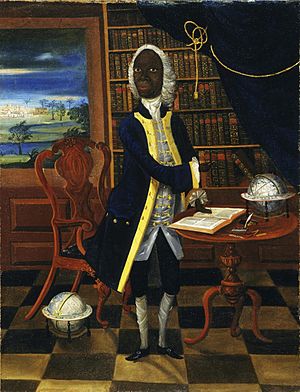Francis Williams (poet) facts for kids
Francis Williams (born around c. 1700, died 1770) was a very smart person who loved to learn and write poems. He was born in Kingston, Jamaica.
Francis traveled to Europe and became a British citizen. In the 1720s, he came back to Jamaica. There, he started a special school for children of free Black families.
Contents
Early Life and Family
Francis Williams was born around the year 1700. His parents, John and Dorothy Williams, were a free Black couple living in the Colony of Jamaica. John Williams had gained his freedom in 1699. This happened because his former owner's will said he should be free.
The Williams family was different from most people in Jamaica at that time. Most people were either British colonists or enslaved Africans. The Williams family owned land and even some enslaved people. This gave them a special status.
It was very rare for Black people in the 1700s to get an education. But Francis and his brothers and sisters could go to school. This was because their father had enough money. Francis later traveled to Europe to continue his studies. He was reported to be there in 1721.
Time in England
While in Europe, Francis Williams became a naturalized citizen of Britain. This meant he had the same rights as someone born in Britain. Enslaved people could not become citizens. He took his citizenship oath in 1723.
Some people, like Edward Long, told a story about Francis Williams. They said a rich man, John Montagu, 2nd Duke of Montagu, paid for Francis's education. The Duke supposedly wanted to see if a Black person could be as smart as white people if given a good education.
This story claimed the Duke sent Francis to a grammar school. Then he supposedly went to the University of Cambridge. However, Cambridge University has no records of Francis Williams studying there. Also, the Williams family was wealthy enough to pay for his education themselves.
Return to Jamaica
In the 1720s, Francis Williams returned to Jamaica. He opened a free school for Black children. In the 1700s, most free schools in Jamaica were only for poor white children. Rich plantation owners often left money to set up schools for them.
In his school, Francis Williams taught many subjects. These included reading, writing, Latin, and mathematics. He wanted to give Black children a chance to learn.
People who supported slavery tried to make Francis Williams's achievements seem small. For example, Edward Long wrote a book called History of Jamaica. In it, he questioned if Francis Williams really wrote a popular song called "Welcome, Brother Debtor".
Facing Challenges
Francis Williams faced unfair treatment when he returned to Jamaica. In 1724, a white plantation owner named William Brodrick insulted him. Brodrick called Williams a "black dog." Williams responded by calling Brodrick a "white dog."
Brodrick then hit Williams, making his mouth bleed. Williams fought back, tearing Brodrick's shirt. Williams argued that he was a free Black man. He said he could defend himself, unlike enslaved people who could be punished for hitting a white person.
The Assembly, which was a group of elected white plantation owners, was worried. They were surprised that Williams successfully argued his case. He managed to get Brodrick's attempt to punish him dismissed.
The Assembly complained that Williams's actions were "great encouragement to the negroes of the island." They decided to create a new law. This law made it illegal for any Black person in Jamaica to hit a white person, even if they were defending themselves.
Poetry and Legacy
Francis Williams was known for his poetry. He wrote in English and Latin. His poems showed his intelligence and skill with words.
Here are some parts from his poems:
- "An Ode to George Haldane" (excerpt)
Rash councils now, with each malignant plan,
Each faction, in that evil hour began,
At your approach are in confusion fled,
Nor while you rule, shall raise their dastard head.
Alike the master and the slave shall see
Their neck reliv'd, the yoke unbound by thee.
- "Welcome, welcome Brother Debtor" (excerpt)
What was is made great Alexander
Weep at his unfriendly fate
twas because he cou'd not Wander
beyond the World's strong Prison Gate
For the World is also bounded
by the heavens and Stars above
Why should We then be confounded
Since there's nothing free but Jove.
Francis Williams's life showed that Black people could achieve great things. He proved that education was important for everyone.
See also
 In Spanish: Francis Williams para niños
In Spanish: Francis Williams para niños
- Black British elite, a group of successful Black people in Britain.
- Ignatius Sancho, another Black writer who was also helped by the Montagu family.
- Phillis Wheatley, an early Black poet from America who wrote in English.
 | James Van Der Zee |
 | Alma Thomas |
 | Ellis Wilson |
 | Margaret Taylor-Burroughs |


